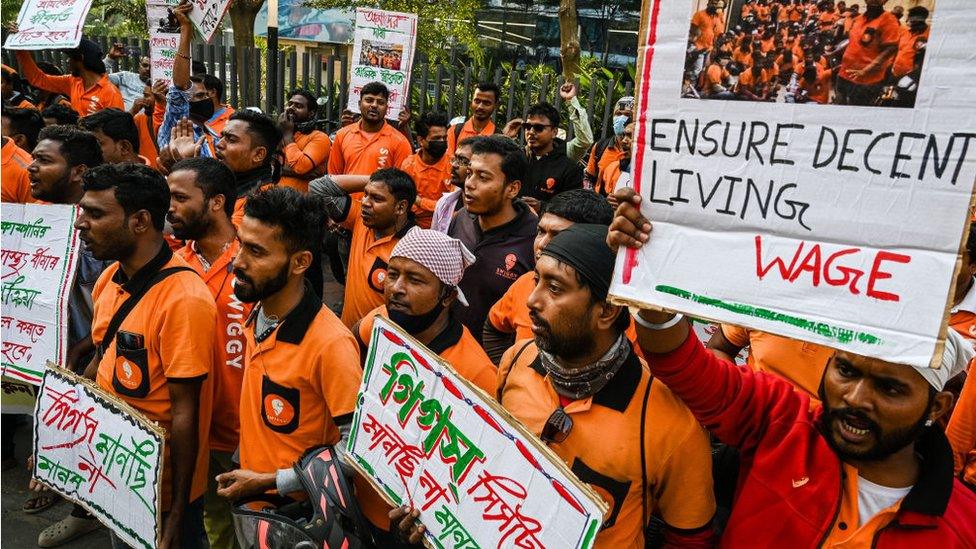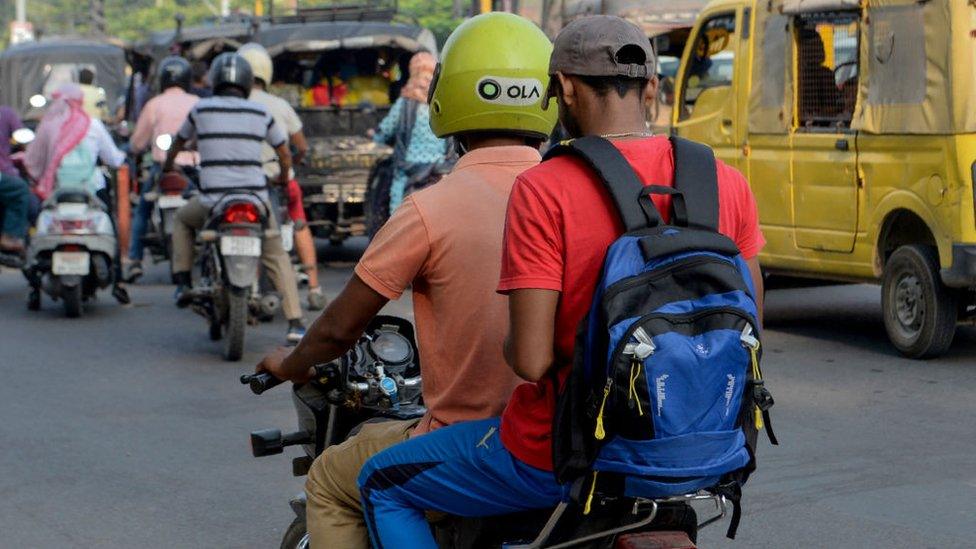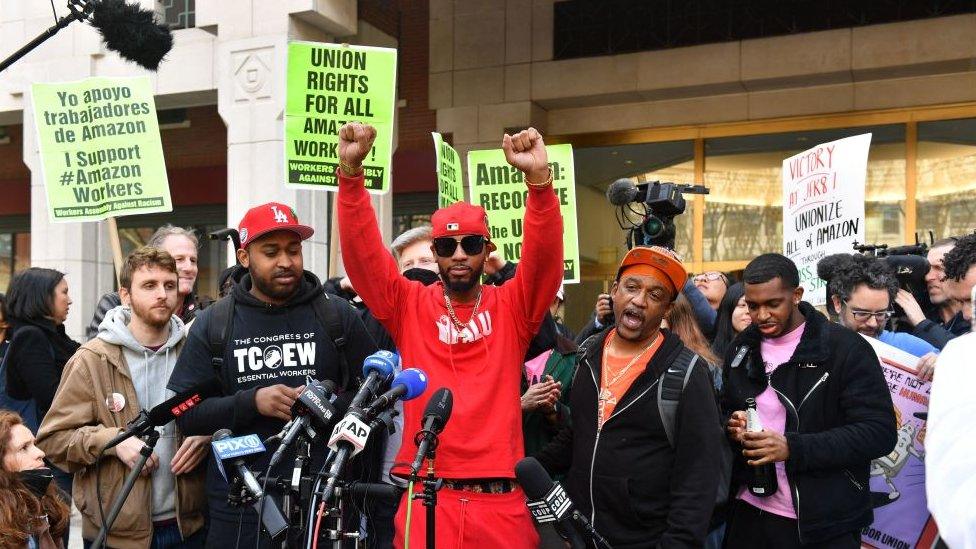Ola, Uber and Zomato: India's gig workers see hope in new state law
- Published

Gig workers in India frequently protest against poor working conditions
Gig workers in India are celebrating a small but significant victory in their ongoing fight for labour rights and better working conditions.
The work is gruelling, hours are long, the pay is meagre and there's no job security or access to basic rights like paid leave, insurance or pension.
But on 24 July, the western state of Rajasthan passed a landmark law that aims to provide platform-based gig workers social security benefits - a right they have been demanding for a long time - among other provisions.
The Rajasthan Platform Based Gig Workers (Registration and Welfare) Act 2023 proposes to set up a social security fund by imposing a welfare tax of 1%-2% on every transaction made by a customer on apps that fall within its ambit, like food delivery and ride sharing. State government grants and contributions by gig workers will also be pooled into the fund.
The law also aims to create an online database of gig workers in the state by registering them and the platforms they're associated with; set up a system to address their grievances and a welfare board to monitor and enforce rules and fine aggregator platforms that don't comply.
Many labour rights activists have praised the law saying it will give gig workers at least some of the rights enjoyed by those in the formal economy. They also say it will provide a model for other states to follow.
But critics argue that the law might slow down the gig economy by irking customers, who may end up paying more for transactions as aggregator platforms could increase prices to pay the welfare tax.

India has millions of gig workers, many of them youngsters
Gig workers even in the US and UK, external have been unionising to demand labour rights. Their Indian counterparts have been doing the same as they aren't included under the country's labour laws, since they are not classified as "employees".
Gig platforms also do not call themselves "employers", preferring the term "aggregators" instead and call their workers "partners" or "independent contractors". Experts say this is unfair as gig workers aren't given a share of the profits but are expected to adhere to rules laid down by the platform.
India has a huge population of platform-based gig workers - a little over seven million, external, according to the government-run think-tank Niti Aayog. But experts say that this number is likely to be higher. The country's soaring population has fuelled shortages in the job market, forcing many - especially youngsters - to turn to gig work to make a living.
Akriti Bhatia, a labour rights activist, calls the Act "significant" as it focusses on registering gig workers, which is the first step towards bringing them under a social security net. "It also makes data transparent, including financial transactions of apps, and this can dissuade platforms from indulging in unfair practices - like deleting a rider's data or charging arbitrary fines," she adds.
Nikhil Dey, member of a workers' rights group that spearheaded the drafting of the bill, says that the new law provides a system for workers to organise themselves by giving them representation in the form of a welfare board. It also offers a breakthrough in the way social security funds can be collected and disbursed.
As per the law, every gig worker registered on the database will be given a unique ID, which will stay the same no matter the platform they work for and will be valid in perpetuity. Worker can use this ID to check their earnings across platforms through an integrated tracking and financial management system.
So, for example, if a driver does two rides with Ola and four with Uber in a day, he can track his earnings across both platforms using the ID. "This system also makes it easy for workers and the board to check who stands to gain how much in social security, depending on their earnings," explains Mr Dey.
The nature of gig work isn't constant, and a worker might switch to another industry and never return; or return to gig work after a couple of months or years. In such a scenario, a person can choose to continue making contributions to the fund and enjoy the benefits after the fund matures, Mr Dey says.
"It was a strategic decision not to push for regulation but to find a way to implement something everyone agrees on - even aggregator platforms agree that gig workers should get social security," he adds.
Experts also say that the Act circumvents some of the problems faced during previous efforts to grant workers social security.

Gig workers in the US have been unionising to demand labour rights
However, some experts have pointed out that the new law does not address more pressing labour rights issues, like a cap on maximum working hours or minimum earnings. They also say that there needs to be more clarity on how the welfare tax is going to be deducted, so that it is not cut from the workers' incentives or made up through fines.
"Only after the law is implemented will we be able to gauge its success," says Nilanjan Banik, an economics and finance professor at Mahindra University.
Ms Bhatia, however, says that the law isn't challenging to implement if there is adequate political will. She also says that it provides a roadmap for the creation of similar laws across states and for different jobs in the unorganised sector.
Lawmakers and governments have become more amenable to the demands of gig workers - associations representing them say it's because they represent a sizeable vote bank.
In 2020, the federal government enacted the Code on Social Security, external, which obligates gig platforms to contribute towards a fund for their workers, but the rules for it are yet to be framed. In July, the Karnataka government announced that it would provide, external free accidental and life insurance cover of 400,000 rupees ($4,827; £3,790) to gig workers and that the state would pay the annual premium.
The new law too was passed by the Congress-led Rajasthan government just months before the assembly elections are due to take place in the state.
Shaik Salauddin, a labour union leader who was a part of government discussions on the bill, says gig workers will continue to put pressure on governments to get their rights. "Parties across the spectrum have realised our potential as a vote bank and they can't ignore us anymore," he says.
BBC News India is now on YouTube. Click here, external to subscribe and watch our documentaries, explainers and features.

Read more India stories from the BBC:
